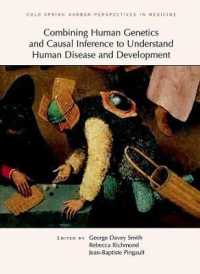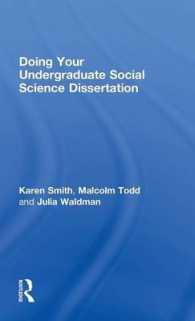Full Description
Criminologists can benefit from questioning the underlying assumptions upon which they rest their work. Philosophy has the ability to clarify our thoughts, inform us of why we think about things the way we do, solve contradictions in our thinking we never knew existed, and even dissolve some dichotomies we thought were cast in stone. One of those dichotomies is free will vs. determinism. Criminology must reckon with both free will and agency, as posited by some theories, and determinism, as posited by others—including the ever more influential fields of genetics and biosocial criminology. Criminological Theory: Assessing Philosophical Assumptions examines philosophical concepts such as these in the context of important criminological theories or issues that are foundational but not generally considered in the literature on this topic. The uniqueness of this treatment of criminological theory is that rather than reporting what this person or that has said about a particular theory, Walsh exposes the philosophical assumptions underlying the theory. Students and scholars learn to clarify their own biases and better analyze the implications of a broad range of theories of crime and justice.
Contents
Chapter 1: The Usefulness of Philosophy in Criminology Chapter 2: Social Constructionism Versus Science in Criminology Chapter 3: Relativism, Rationalism, Empiricism, and Paradigm Shifts Chapter 4: Essentialism and Reductionism: Enemies or Friends? Chapter 5: What is Real and How Do We Know? Chapter 6: Materialism and Idealism: Structure versus Culture Chapter 7: Conflict and Cooperation; Alienation and Equality Chapter 8: Rationality and Emotion Chapter 9: Right and Wrong: Conscience Chapter 10: The Science Wars and Ideology in Criminology Chapter 11: Ideology and Causation Chapter 12: The Philosophy and Science of Human Nature Chapter 13: Feminist Criminology and Contending Metaphysics Chapter 14: Origins of the Intuition of Justice Chapter 15: Punishment: Justifications and its Role in the Evolution of Justice








